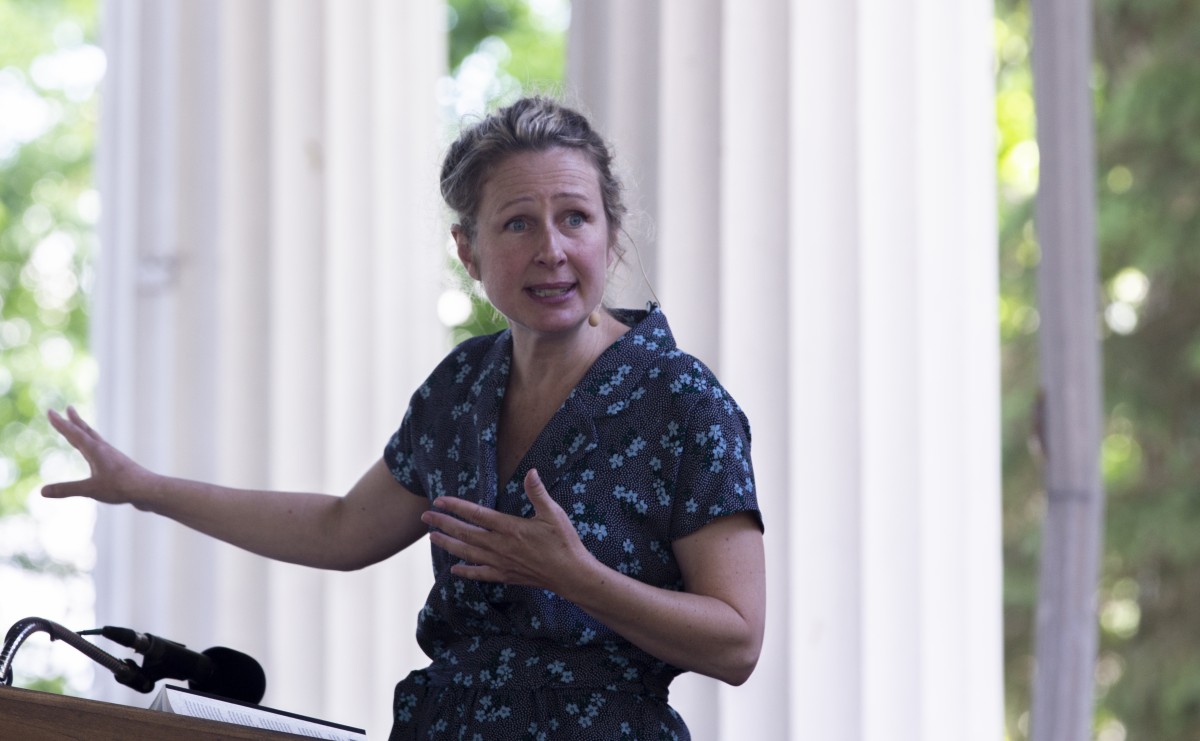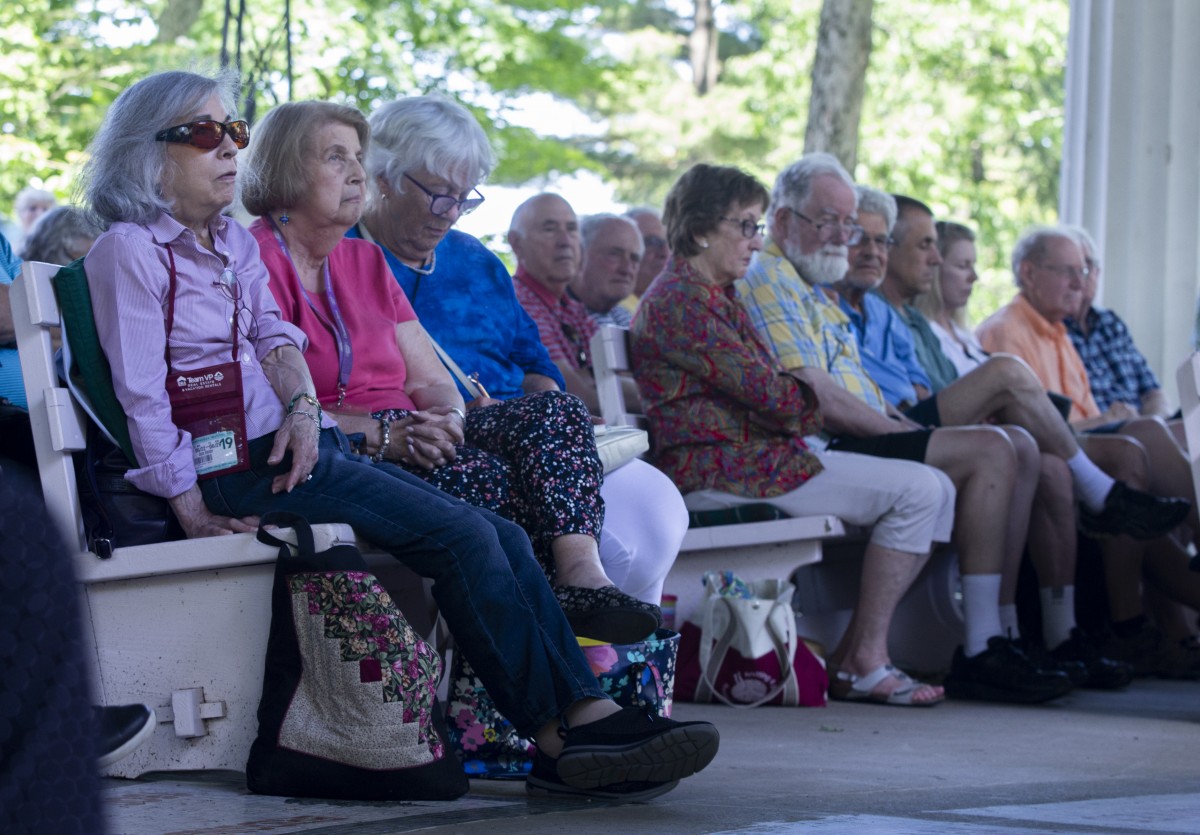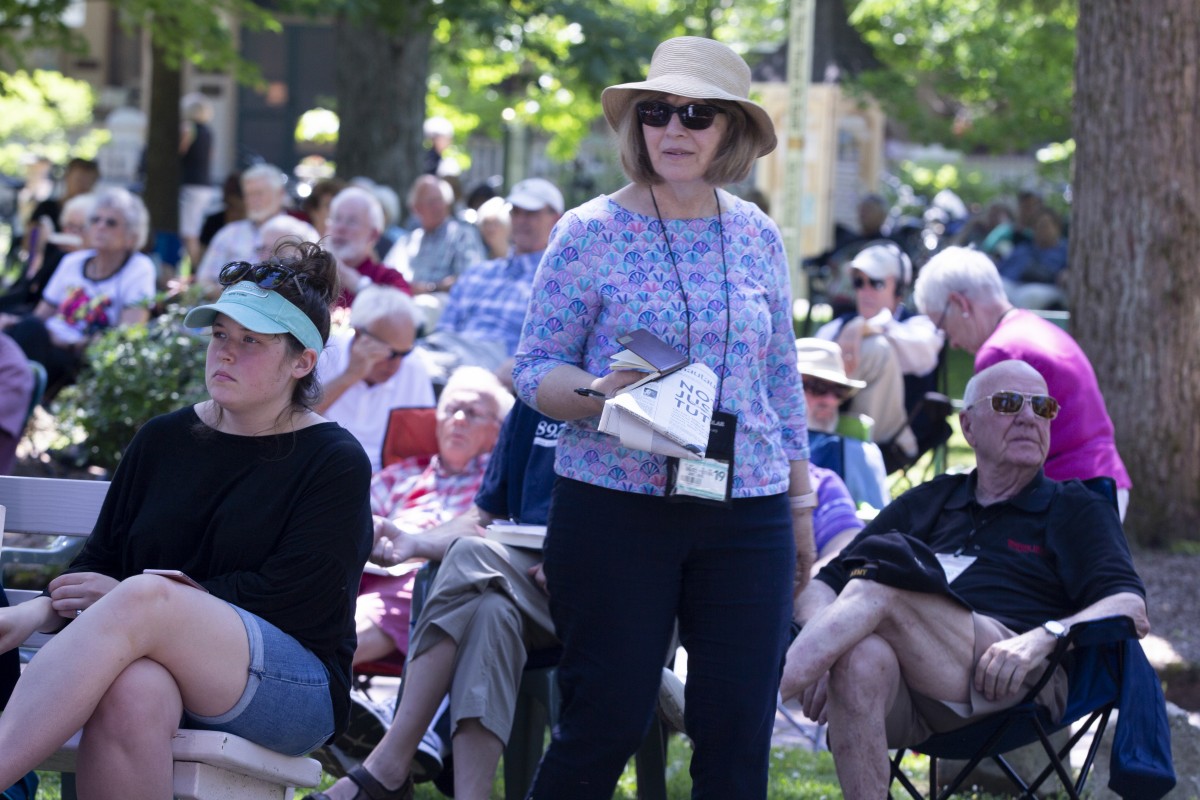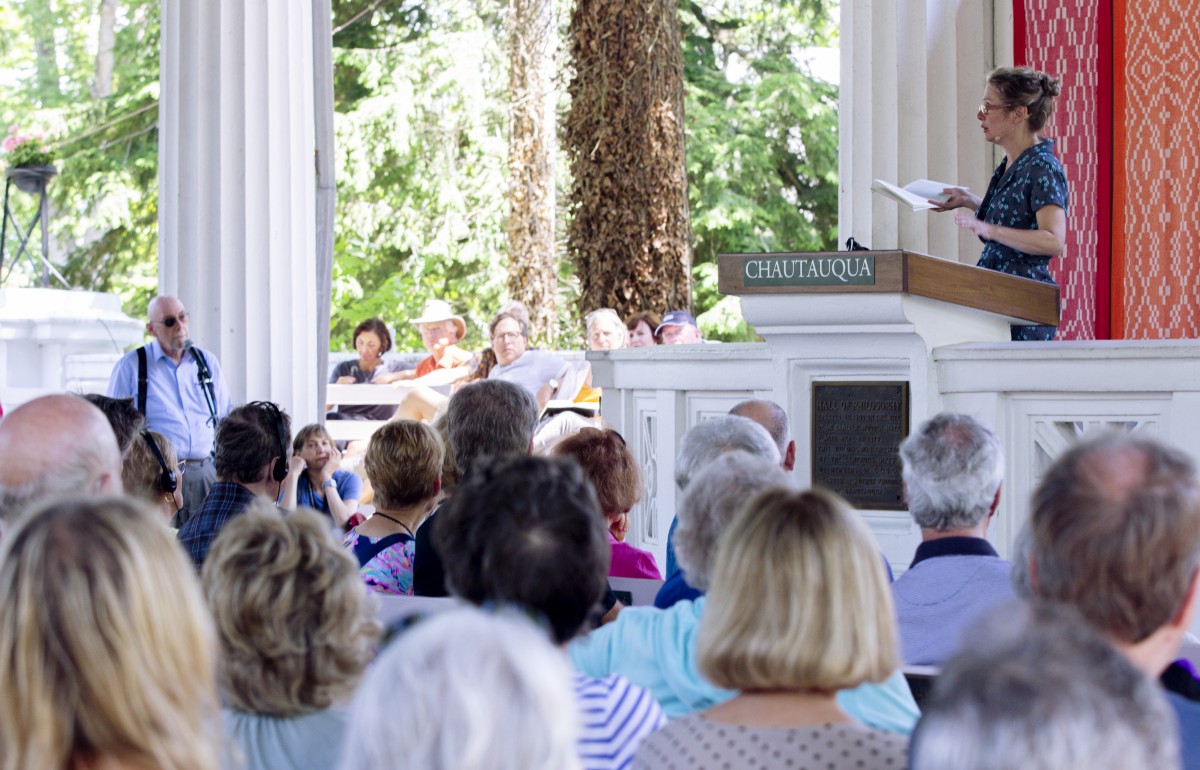Amy Laura Hall, Duke University’s Divinity School associate professor of Christian ethics, opened her lecture at 2 p.m. Wednesday in the Hall of Philosophy by imploring the audience to judge her new book, Laughing at the Devil: Seeing the World with Julian of Norwich, by its cover.
“One of the reasons I would love for you to judge the book by its cover is because Julian of Norwich, this medieval visionary who lived at the turn of the 14th to the 15th century, received visions from God that nothing and no one will be lost,” Hall said.
Julian of Norwich, who lived in a port city in England, was the first known woman to have written a book in English. Despite this incredible accomplishment, however, Hall said Julian of Norwich continues to be unacknowledged by people today.
“And there are people in my life who say to me, ‘Why would I read Julian of Norwich when I have not yet read everything by St. Augustine? Why read Julian of Norwich when St. Augustine of Hippo changed everything with his writings?’ ”
To these questions, Hall said Julian of Norwich offered a unique perspective because she wanted answers to the questions that St. Augustine had not asked, or had not asked when Julian of Norwich was living.
“I don’t know if she changed the world, but she changed my world,” Hall said. “And I invite you to consider the possibility that seeing the world with her could be a gift to you.”
Hall then began her discussion of Julian of Norwich with a confession: she had come to Julian of Norwich by accident.
“The most radical part of Julian’s visions… is her understanding of time,” says @ProfligateGrace
— The Chautauquan Daily (@chqdaily) June 26, 2019
“I first read Julian’s Revelations of Divine Love in a hurry and with impatience,” Hall said. “It was 1999, and I had just started my position as a new teacher. I was then teaching a large Introduction to Christian Ethics class and I did not have a single woman on the syllabus.”
She asked around and people suggested she include Julian of Norwich. Hall had never heard of her, and, at first, thought she sounded stupid.
Julian of Norwich, in fact, was the writer of “All shall be well, all shall be well, all manner of things shall be well.” “All shall be well” and other versions of this message were something Hall was all too familiar with. She had heard too many Christians use some version of lines like “all things work for good for those who endure misery,” when the person listening to the words simply needed a friend there in silence.
“I had also seen ‘all is well’ language used like a Jedi mind trick on people who were grieving,” Hall said. “No, thank you. No more of that soporific crap for me.”
In spite of Hall’s strong first impression of Julian of Norwich, she kept getting recommended, and Hall was finally convinced to add her to the syllabus. The next obstacle for Hall was figuring out how to teach Julian of Norwich.
“I incorporated ways of teaching Julian as I tried to convince mostly Protestant students to consider opening her book, to spend time reading her words,” Hall said, “even if they hadn’t read everything St. Augustine had ever written.”
In thinking about how to write about her, Hall had to create a new word: “omniamity,” or lovingness. Hall then quoted Julian of Norwich directly:

“Though the three persons in the trinity are all equal in themselves, my soul understood love most clearly, yes. And God wants us to consider and enjoy love in everything and this is the knowledge which we are the most ignorant. For some of us believe that God is almighty and has power to do everything and that God has wisdom and knows how to do everything but that God is all love to do everything? There, we stop.”
Hall went on to say that she had always learned that, yes, God was omnipotent and omniscient. However, she always found it almost impossible to believe that God is all love and truly all love. Yet Julian wrote that God was.
“Julian was a visionary,” Hall said. “You have to know something about her time period to understand how radical her visions are.”
Around the time Julian’s words were spreading, people living and thinking in ways counter to church teaching were being threatened in England, imprisoned and tortured — King Henry IV and the Archbishop of Canterbury believed they needed to reinforce their own powers with every intertwined form of control available to them.
Additionally, King Henry IV and his parliament passed a statute in 1401, which ordered any person adhering to heretical views to be “publicly burned on a high place.” The statute also stated that this sort of punishment should strike fear into the minds of others.
“The century in which Julian received her visions and wrote her words about them culminated in a royal decree to regulate who was allowed to write and to speak about God,” Hall said.
Amid such tragedy in England, Julian’s life in Norwich was not very different from any other post-disaster moment in western history, Hall said. When Julian was a young child, the Black Plague killed half of the port city and created a sense of impending doom among those who survived.
Ultimately, Hall said, all the sadness, violence and loss created doubt in the minds of the people who were still alive. They began to question God and whether God was all-loving.
“One of the ways of thinking about evil.. is that God was encouraging obedience,” says @ProfligateGrace
— The Chautauquan Daily (@chqdaily) June 26, 2019
“During this time, Julian received a vision of Jesus’ blood coming to her with no intermediary,” Hall said. “This is a time when the Lord’s Supper was strictly parcelled out according to rank. So, she is seeing visions of Jesus’ blood coming to her and for her, with no intermediary, during the same decade when customarily only priests received the blood.”
Julian then received another vision of God “kinning” people through Jesus’ blood.
“She’s received a vision in which there are no distinctions of different kinds of blood,” Hall said.
This is significant because, at this time, feudalism created divides between social classes; titles ranked people. Yet, in this vision, Julian saw no distinction between title, rank or blood. Everyone was “kinned” with Jesus’ blood.
In addition to this vision of equality among all socioeconomic classes, she also had a vision about time.
“The most radical part of Julian’s visions, in my experience of teaching her, is her understanding of time,” Hall said. “All that is, all that ever has been and all that ever will be has collapsed on the poynte that is the cross. And everything, then, that she sees is through this little opening.”
Hall said that, through this opening, Julian was able to witness a different way of seeing everything so that time is not progressive.
“So, Julian received this vision of time that everything that is has been collapsed into this aperture that is the cross, which also means … God never sees us apart from God’s love for Jesus,” Hall said. “She writes that if there could be any anger in God, we would cease to be.”
Julian grew up during the time of the the Great Plague, often causing people to as, “Who is God? Is God all loving?” says Hall
— The Chautauquan Daily (@chqdaily) June 26, 2019
Julian knew this because of another vision she had seen that demonstrated God’s “omniamity.” She saw a vision in which God saw the first Adam always through Jesus, the second Adam.
“God never sees us apart from God’s love,” Hall said. “The first Adam becomes so beloved, collapsed into the cross, that God’s love for us is how God sees us.”
One of the largest critiques of Julian of Norwich is that she never mentions evil and how it functions in the world. Hall suggested that evil can be understood as God using human beings as “object lessons.” In this way, he encourages obedience.









